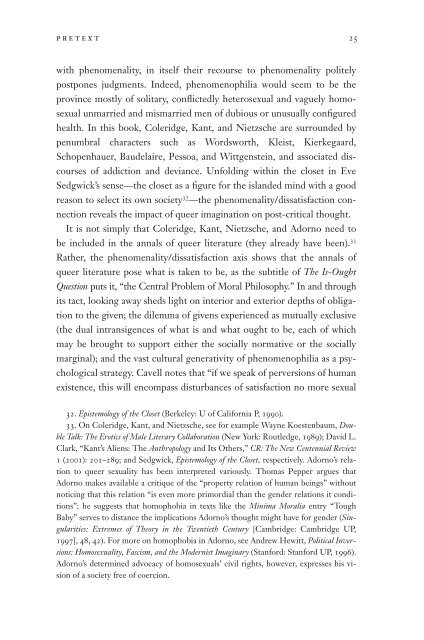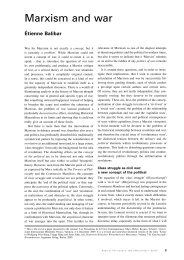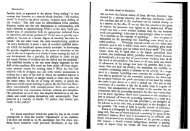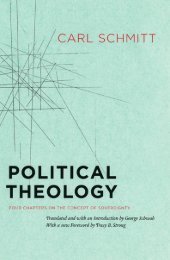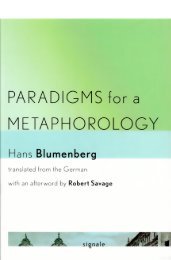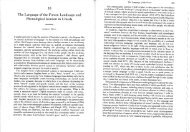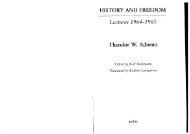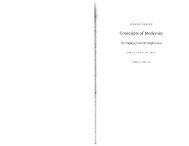Terada - Looking Away (Selections).pdf - Townsend Humanities Lab
Terada - Looking Away (Selections).pdf - Townsend Humanities Lab
Terada - Looking Away (Selections).pdf - Townsend Humanities Lab
Create successful ePaper yourself
Turn your PDF publications into a flip-book with our unique Google optimized e-Paper software.
pretext 25<br />
with phenomenality, in itself their recourse to phenomenality politely<br />
postpones judgments. Indeed, phenomenophilia would seem to be the<br />
province mostly of solitary, conflictedly heterosexual and vaguely homosexual<br />
unmarried and mismarried men of dubious or unusually configured<br />
health. In this book, Coleridge, Kant, and Nietzsche are surrounded by<br />
penumbral characters such as Wordsworth, Kleist, Kierkegaard,<br />
Schopenhauer, Baudelaire, Pessoa, and Wittgenstein, and associated discourses<br />
of addiction and deviance. Unfolding within the closet in Eve<br />
Sedgwick’s sense—the closet as a figure for the islanded mind with a good<br />
reason to select its own society32 —the phenomenality/dissatisfaction connection<br />
reveals the impact of queer imagination on post-critical thought.<br />
It is not simply that Coleridge, Kant, Nietzsche, and Adorno need to<br />
be included in the annals of queer literature (they already have been). 33<br />
Rather, the phenomenality/dissatisfaction axis shows that the annals of<br />
queer literature pose what is taken to be, as the subtitle of The Is-Ought<br />
Question puts it, “the Central Problem of Moral Philosophy.” In and through<br />
its tact, looking away sheds light on interior and exterior depths of obligation<br />
to the given; the dilemma of givens experienced as mutually exclusive<br />
(the dual intransigences of what is and what ought to be, each of which<br />
may be brought to support either the socially normative or the socially<br />
marginal); and the vast cultural generativity of phenomenophilia as a psychological<br />
strategy. Cavell notes that “if we speak of perversions of human<br />
existence, this will encompass disturbances of satisfaction no more sexual<br />
32. Epistemology of the Closet (Berkeley: U of California P, 1990).<br />
33. On Coleridge, Kant, and Nietzsche, see for example Wayne Koestenbaum, Double<br />
Talk: The Erotics of Male Literary Collaboration (New York: Routledge, 1989); David L.<br />
Clark, “Kant’s Aliens: The Anthropology and Its Others,” CR: The New Centennial Review<br />
1 (2001): 201–289; and Sedgwick, Epistemology of the Closet, respectively. Adorno’s relation<br />
to queer sexuality has been interpreted variously. Thomas Pepper argues that<br />
Adorno makes available a critique of the “property relation of human beings” without<br />
noticing that this relation “is even more primordial than the gender relations it conditions”;<br />
he suggests that homophobia in texts like the Minima Moralia entry “Tough<br />
Baby” serves to distance the implications Adorno’s thought might have for gender (Singularities:<br />
Extremes of Theory in the Twentieth Century [Cambridge: Cambridge UP,<br />
1997], 48, 42). For more on homophobia in Adorno, see Andrew Hewitt, Political Inversions:<br />
Homosexuality, Fascism, and the Modernist Imaginary (Stanford: Stanford UP, 1996).<br />
Adorno’s determined advocacy of homosexuals’ civil rights, however, expresses his vision<br />
of a society free of coercion.


